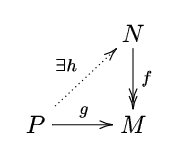Projective module
|
|
In mathematics, particularly in abstract algebra and homological algebra, the concept of projective module over a ring R is a more flexible generalisation of the idea of a free module (that is, a module with basis vectors). Various equivalent characterizations of these modules are available.
| Contents |
Definitions
Direct summands of free modules
The easiest characterisation is as a direct summand of a free module. That is, a module P is projective provided there is a module Q such that the direct sum of the two is a free module F. From this it follows that we can think of P as a kind of projection in F: the module endomorphism in F that is the identity on P and 0 on Q is an idempotent matrix.
Lifting property
Another way that is more in line with category theory is to extract the property, of lifting, that carries over from free to projective modules. Using a basis of a free module F, it is easy to see that if we are given a surjective module homomorphism from N to M, the corresponding mapping from Hom(F,N) to Hom(F,M) is also surjective (it's from a product of copies of N to the product with the same index set for M). Using the homomorphisms P->F and F->P for a projective module, it is easy to see that P has the same property; and also that if we can lift the identity P->P to P->F for F some free module mapping onto P, that P is a direct summand.
We can summarize this lifting property as follows: a module P is projective if and only if for any surjective module homomorphism f : N → M and every module homomorphism g : P → M, there exists a homomorphism h : P → N such that fh = g. (We don't require the lifting homomorphism h to be unique; this is not a universal property.)
The advantage of this definition of "projective" is that it can be carried out in categories more general than module categories: we don't need a notion of "free object". It can also be dualized, leading to injective modules.
For modules, the lifting property can equivalently be expressed as follows: the module P is projective iff for every surjective module homomorphism f : M → P there exists a module homomorphism h : P → M such that fh = idP. The existence of such a section map h implies that P is a direct summand of M and that f is essentially a projection on the summand P.
Vector bundles and locally free modules
A basic motivation of the theory is that projective modules (at least over certain commutative rings) are analogues of vector bundles. This can be made precise for the ring of continuous real-valued functions on a compact Hausdorff space, as well as for the ring of smooth functions on a compact smooth manifold (see Swan's theorem).
Vector bundles are locally free. If there is some notion of "localization" which can be carried over to modules, such as is given at localization of a ring, one can define locally free modules, and the projective modules then typically coincide with the locally free ones. Specifically, a finitely generated module over a commutative ring is locally free if and only if it is projective.
Facts
Direct sums and direct summands of projective modules are projective.
If e = e2 is an idempotent in the ring R, then Re is a projective left module over R.
Submodules of projective modules need not be projective; a ring R for which every submodule of a projective left module is projective is called left hereditary.
Every module over a field or skew field is projective (even free). A ring over which every module is projective is called semisimple.
An abelian group (i.e. a module over Z) is projective iff it is a free abelian group. The same is true for all principal ideal domains; the reason is that for these rings, any submodule of a free module is free.
Every projective module is flat. The converse is in general not true: Q is a flat abelian group which is not projective.
Given a module, M, a projective resolution of M is an exact sequence (possibly infinite) of modules
- · · · → Pn → · · · → P2 → P1 → P0 → M,
with all the Pi's projective. Every module possesses a projective resolution. Such an exact sequence may sometimes be seen written as an exact sequence P(M) → M → 0.
In line with the above intuition of "locally free = projective" is the following theorem due to Kaplansky: over a local ring, R, every projective module is free. This is easy to prove for finitely generated projective modules, but the general case is difficult.
The Quillen-Suslin theorem is another deep result; it states that if K is a field and R = K[X1,...,Xn] is a polynomial ring over K, then every projective module over R is free.es:Módulo proyectivo

